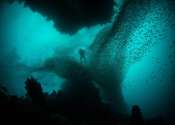Small but mighty, plankton are among the most powerful creatures on Earth
If you go to the beach and dip a bucket in the sea, you might at first think it contains lifeless water. But examine that water under a microscope and you will see your bucket contains a universe of microscopic life, in the ...









